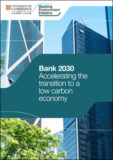A new report from the Banking Environment Initiative (BEI) highlights the need for the banking sector to develop an ‘active mindset’ in order to accelerate the transition to a net zero carbon economy. Pioneering banks have started to adopt this mindset, approaching the decarbonisation of the economy as a strategic opportunity.
The research, carried out by the University of Cambridge Institute for Sustainability Leadership (CISL) and based on 100 interviews, including 88 with senior bankers in Europe, Asia and the Americas, found that, despite the new challenges thrown up by the climate crisis, many remained in their comfort zones, working on a banking-as-usual basis.
Bank 2030: Accelerating the transition to a low carbon economy revealed other banks to be adopting pioneering behaviour – actively ‘leaning in’ with clients to support their transition to low carbon choices. Hallmarks of banks moving to an active mindset were the prioritisation of client relationships over individual transactions, innovating to help clients secure capital for low carbon investments at competitive rates, and driving collaborations with experts to support clients in their transitions.
Simon Connell, Chair of the BEI and Head of Sustainability Strategy, Standard Chartered said: “We’re seeing significant growth in low-carbon financing, but even more is needed to support the 2030 Agenda and meet the Paris Agreement goals. BEI’s Bank 2030 report provides all banks with recommended actions they can take to support their clients’ needs as they move toward a net zero carbon economy.”
Global warming is already at 1C above pre-industrial levels, with insured losses from natural disasters reaching $134bn in 2017, the second costliest year on record, and one study attributing 70 per cent of extreme weather events evaluated since 2012 to climate change.
It is estimated that without deep and sustained cuts to greenhouse gas emissions, the world is on course for a 2C increase around 2050. This could mean an increase in the global population facing water scarcity of nearly 400 million, and the cost of annual flood damage losses from rising sea levels of more than $11tn.
This new research aims to address the challenge of how banks can accelerate financing a net zero transformation, and to develop a vision of a climate progressive bank in 2030.
Dr Nina Seega, Research Director, Centre for Sustainable Finance at CISL said: “What this report shows is that innovation, expanding product coverage and institutionalising sustainable finance is key for financing the transition to a net zero future. A pure transaction focus is no longer sufficient, and difficult decisions need to be made about stopping the financing of some projects. 2020 is a pivotal year for moving from making commitments to tangible sustainable finance action. This report provides concrete opportunities for banks to accelerate transition to a net zero economy.”
The vision of Bank 2030 is one of pro-active engagement with low carbon opportunities that will transition client business models, in the belief that these actions are essential to future returns, management of risks and maintaining societal licence to operate.
The report highlighted progressive practices to channel capital into the low carbon economy independent of regulatory or policy support, including:
- Taking direct risk exposure with clients e.g. green loans
- Structuring via capital markets e.g. transition bonds
- Increasing lending capacity e.g. green securitisation
It also explores where and how pioneering banks aiming to accelerate the transition could focus next, such as agriculture, automotive and hard-to-abate sectors, like cement.
The Banking Environment Initiative (BEI) is a collective of global banks who together pioneer actionable pathways towards a sustainable banking system. Convened by the University of Cambridge Institute of Sustainability Leadership (CISL), the BEI works collaboratively with its member banks, their clients, key stakeholders and academics to direct capital towards achieving the Sustainable Development Goals. Bank 2030 was supported by a select group of BEI members, made up of Lloyds, BNP Paribas, Standard Chartered, Santander and Deutsche Bank, as well as LBBW, Morgan Stanley and Wells Fargo. The work of the BEI informs CISL’s Centre for Sustainable Finance, which is helping financial institutions to play a leading role in building a more sustainable economy.
The work of the BEI informs CISL’s Centre for Sustainable Finance which is helping financial institutions to play a leading role in building a more sustainable economy.




